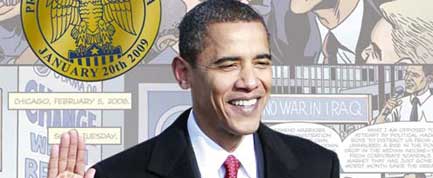Cheney vs. Obama: Dueling Unprovable Claims

Get the world’s most fascinating discoveries delivered straight to your inbox.
You are now subscribed
Your newsletter sign-up was successful
Want to add more newsletters?

Delivered Daily
Daily Newsletter
Sign up for the latest discoveries, groundbreaking research and fascinating breakthroughs that impact you and the wider world direct to your inbox.

Once a week
Life's Little Mysteries
Feed your curiosity with an exclusive mystery every week, solved with science and delivered direct to your inbox before it's seen anywhere else.

Once a week
How It Works
Sign up to our free science & technology newsletter for your weekly fix of fascinating articles, quick quizzes, amazing images, and more

Delivered daily
Space.com Newsletter
Breaking space news, the latest updates on rocket launches, skywatching events and more!

Once a month
Watch This Space
Sign up to our monthly entertainment newsletter to keep up with all our coverage of the latest sci-fi and space movies, tv shows, games and books.

Once a week
Night Sky This Week
Discover this week's must-see night sky events, moon phases, and stunning astrophotos. Sign up for our skywatching newsletter and explore the universe with us!
Join the club
Get full access to premium articles, exclusive features and a growing list of member rewards.
There's an old joke about a man putting his young son to bed one night. Before the boy goes to sleep, he pulls out a whistle from under his pillow and blows it loudly. The father, startled, asks his son why he blew the whistle. "It's to keep tigers away while I sleep," the boy explains. "Son, that's silly," the father says. "There are no tigers within a thousand miles of here." The boy looks up and replies, "See? It works!"
Last week, President Obama and former vice-president Cheney held dueling press conferences about the state of American security.
Cheney repeated an assertion he made during a recent interview on "Face the Nation," in which he said that Obama's efforts to repeal Bush-era policies on interrogation and detention have "made this country more vulnerable" to another terrorist attack. "We [the Bush administration] put in place some very good policies, and they worked, for eight years."
Cheney believes that the fact that another successful terrorist attack has not occurred on American soil since 2001 somehow proves that the Bush policies have been effective in preventing them. (The irony that Cheney criticized President Obama about safeguarding America—something Bush and Cheney failed to do on Sept. 11—was apparently lost on him.)
Yet this claim rests on bad logic; it is a variation of a fallacy called post hoc ergo propter hoc, or "after this, therefore because of this," also known as faulty causation.
While it may be true that the Bush policies did indeed prevent further attacks, there could be many unrelated reasons why another attack did not occur.
It is impossible to prove the claim that the policies "worked for eight years." They may have; or they may have been a complete failure. The lack of another terrorist attack does not prove it either way. Such claims are impossible to prove one way or the other; they are what in logic are called unfalsifiable propositions. There is simply no way to know with much certainty what the long-term (or even short-term) consequences of a given action will be.
Get the world’s most fascinating discoveries delivered straight to your inbox.
President Obama made a similar argument recently in his decision not to release more photographs of U.S. military personnel abusing prisoners in Iraq and Afghanistan. After strenuous objections by top Pentagon officials, Obama reversed his earlier decision, saying that "the most direct consequence would be to further inflame anti-American opinion and put our troops in greater danger."
Cheney's claim that Obama has made America more vulnerable to terrorist attack is possibly true, yet unprovable. Similarly, Obama's claim that releasing new photos of prisoner abuse would further endanger American troops is also possibly true, yet equally unprovable.
The public should be skeptical when politicians throw around unquantifiable, vague threats of "greater danger" or "greater vulnerability" resulting from a given action. Political theater is one thing, but in the real world decisions and their consequences are rarely clear or obvious.
Benjamin Radford is managing editor of the Skeptical Inquirer science magazine. His books, films, and other projects can be found on his website.

 Live Science Plus
Live Science Plus










